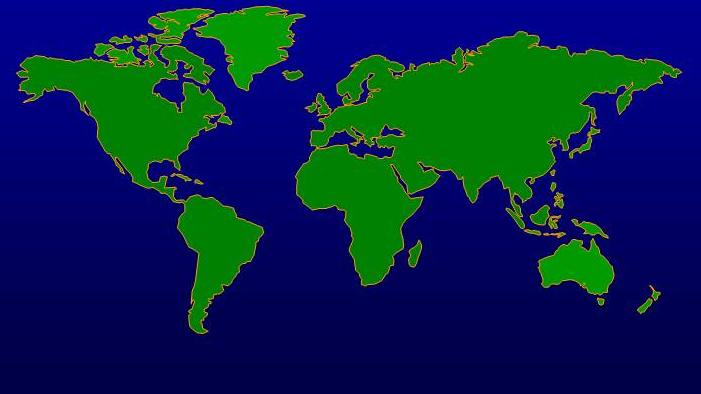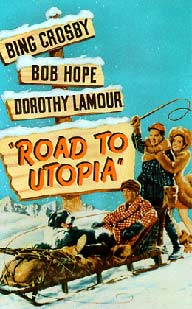|
LITR 5439 Literary & Historical Utopias |
|
Daniel Stuart
June 25, 2013
Utopia As No Man's Land: The Argument Against Utopia
It is said that wanderlust “is the state of
looking for something and almost knowing you’re never going to find it” (Bjork).
Much the same sentiments can be translated to search for utopia. So many seek
other than what they have, newer places from where they are and better
conditions under which they can be nourished. Offered choices of lifestyle and
means of maneuverability, the quest for “a more perfect union,” to borrow the words
of the U.S. Constitution, is an ongoing undertaking without, seemingly, any indication
of letting up. This search for that other, that utopian ideal is a constant
pursuit of that “more perfect,” more egalitarian society, the better integrated
civilization. The literature studied in this course has led many not unlike
myself to examine the possibility for such a supreme model of living. It is a
question the individual often asks every day just as the collective comes to
demand newer, better modified modes of doing things. Possibility and potential,
after all, are the only real necessity for hope. And yet many, also like myself,
have come to the resolution that utopia, no matter how elaborately configured,
no matter how pragmatically envisioned, can never meet up with the ideal; more
to that, it can never sustain even the initiation of such a superlative vision.
The following paper will feature analysis of several fellow classmates who
similarly feel that the utopia is an unattainable ideal, largely owing to
essential truths such as the variability of vision, fallibility of man or the
stunting of ingenuity and sustainable development by restrictive ideologies.
Examination of each author's analysis and rhetoric will be employed to present a
coherent, unified evaluation of the argument for an unattainable utopia.
In her essay “The Perfect Utopia: A
Contradiction in Terms,” Katie Parnian contrasts the idea of a utopian
civilization with the idea of a perfect romance, one which endures “happily ever
after.” The author relates how she, like “many middle-class Caucasian women,”
desired the prototypical American dream: marriage, suburban home, children, etc.
(Parnian). This was her utopia, a far cry, she relates, from the independent
women of Herland existing within a highly exclusionary society devoid of
male interference. The point Parnian is really trying to make is that not all
versions of utopia are the same. Later in her essay, she concludes that
Herland cannot be an ideal society as it does not offer a place for males
though she elaborates little in the way of justification for this, only
addressing the unrealistic nature of the situation. She draws another example by
contrasting Anthem (a society forcibly ignorant of the past) and More's
Utopia with Looking Backward citing the latter's incorporation of
historical data into its prevailing ideology, including excerpts between Dr.
Leete and Bellamy addressing history as a learning tool. "More's Utopia," she
says, "does not have such a basis of comparison, since it [is] portrayed as
having been founded in accordance with the same ideals set forth by its founder,
Utopus." Hence it "becomes
difficult to imagine how the citizens of Utopia really appreciate or are happy
with their ideal society" (Parnian).
The author concludes her argument stating
that no one utopia can satisfy everyone; "the richness and diversity of human
individuality" is too great an obstacle to overcome (Parnian). She then suggests
an alternative to the physical utopian model with the implementation of
internalized spiritual principles, guiding religious and philosophical precepts
by which each and every individual may involve themselves with. The essay is a
good exploration of the contrasting ways in which humans devise ideal
civilizations. It is difficult to foresee how a successful utopia can be erected
and sustained when several of the more enlightened literary minds share the
difficulty of agreeing on a singular model. Perhaps a more detailed closing
argument and conclusion could have been articulated, reinforcing the essay's
position and the author's convictions, but there is reason to applaud her
rationale.
Like Parnian, Chrissie Johnston makes a
similar case for the impossibility of utopias even if her rhetoric doesn't quite
rule out the possibility that such a society could exist. A schoolteacher as
well as student studying utopian and dystopian literature, she notes the
limitations on personal freedoms, a running theme in texts like Utopia,
Looking Backward & Herland, is the primary drawback to a successfully
run society. Arguing that "a large portion of the world spends a large portion
of their 'free' time and money on pleasures" relating more to self-indulgence, a
civilization focused on cultivating healthy leisure activities through things
like reading, studying and discourse could never function at a high level
(Johnston). The disabling of private ownership and personalized handling of
money is not only a drawback--she mentions how students she's taught object to
this notion in particular--but an "unobtainable dream." Money has become so much
a necessity, a central focus even, of our current society that the
implementation of a system devoid of wages, currency and financial industry is
largely a conceptual impossibility. The auhor is, however, rather keen on
addressing the allure and desirability of such a way of life (her essay's title
is "The Attraction to Perfection"), noting how the egalitarian system of
educational and professional pursuits paints a nice picture in Looking
Backward. Also, there is a wholesome, if sentimental attraction to the
rooting out of selfish instincts and desires by the utopian vision, as witnessed
in Utopia and Herland where the "feeling of togetherness" fosters a desirable
quality in which no one gets left out and where cliques are largely eradicated
(Johnston).
Johnston's essay is largely centered on the literary importance of the
subgenre. She overtly states that teaching dystopias prompt more vigor among
students than utopias for the obvious reasons having to do with the
confrontation of ideas and societal issues. Yet there is an important point
whhich is inherent in her essay, even involving the fact that dystopias evoke
more of a reaction than utopias, and it's that while the vision of collective
utopia is a tempting convention, self-interest and personal ambition have a way
of inevitably interfering with the carrying out of such an ideal. Additionally,
without independent initiative, the introduction of new ideas and concepts might
never come about; the essay mentions Bill Gates and Mark Zuckerberg as
supporting examples sharing the same conviction Equality 7-2521/Prometheus. A
fully-integrated, cooperative civilization isn't necessarily impossible, the
author seems to say. It's just that the very fact of possibility available to
the individual so supercedes the desire for community.
"For as long as humanity is imperfect, utopia
is beyond us . . . ," says the author of "The Hypocritical World of Utopias"
(c.n.r.). Utopias themselves are an illusion, partially owing to the fact that
their vision (in the literary sense) is always contradicting itself. Taking the
gold example from More's Utopia,
the essay argues that the utopians are acting in a hypocritical manner when they
discourage the value of precious metals among the populace while privately
keeping a stocked reserve to use when necessary. It is a meticulously
constructed deception arranged so that citizens of Utopia will not only disavow
the desire for private possession and ownership, but that they will willingly
part with it should the occasion present itself. To further the point, the very
concept of utopia is hypocritical in that it blatantly ignores the fact that
"without conflict there is no growth." Life cannot be lived apart from conflict,
from a "world full of speed bumps, ups and downs, like a huge roller coaster
ride." Much of the argument is on target even if it may overstate several issues
and even miss on some points but the case made for a necessarily flawed society
is a valid premise. Additionally the author alludes to the brokenness and fallen
nature of man in the world, reiterating some of Kate Parnian's convictions
regarding the inherently doomed state of the utopian vision. Heaven is the only
real utopia, and that only because it is a "completely different ontological
experience than we have now."
Little more than a century ago, the greatest
novelist who ever lived lay on his deathbed in an isolated Russian train
station. Having given up novels for more noble pursuits, his widespread fame and
highly publicized religious and socio-political leanings had prompted the advent
of a new socialist utopian movement loosely adhering to his namesake so much so
that thousands throughout the world adapted his philosophy of simple living,
equal division of wealth, pacifism and nonviolent resistance. Yet the inability
to agree on the doctrines and intentions of that one man's legacy largely
defamed his legend and nearly destroyed his work. Fortunately for Leo Tolstoy,
he would die at the station and not have to endure the quibbling and bickering
about who his work should be relegated to for the succeeding years. His wife and
his best friend, who had butted heads more than a few times during the author's
life, would ultimately take their claims on the great man's life and work to a
court where the whole of his estate and a life's worth of writing were settled.
Not the utopia, but the very vision for the utopia had to bow to that most
hated of adversaries--a bureaucratic institution which fostered a culture of
arbitration and divisions. It is still one of the best examples of selfishness
and singularity of mind interfering in the proliferation of a (relatively)
thriving utopian communal ideal (Parini). Utopian literature is very
self-evidently wrought with imperfections and questionable, at best, cooperative
policies. It is as easy to poke holes in one theory or another of a civilized
paradise on earth as it is to do the same to our current society. For all of the
grand schemes of collective production and integrated community, there are as
many contradictions, hypocrasies and incidents of self-interest. Perhaps in
another life, and to be precise, another dimension of conscious existence, there
can be perfection of the utopian ideal, but not in this life.
Works Cited
Bjork. "Wanderlust" Volta. One Little Indian. April
2008
Johnston, Chrissie. "The Attraction to Perfection." White
Coursesite. Midterms 2011.
More, Thomas. Utopia. New York: Penguin, 2004.
Parini, Jay. The Last Station. New York: Knopf, 2001.
Parnian, Katie. "The Perfect Utopia: A Contradiction in
Terms." White Coursesite. Midterms 2011.
Rand, Ayn. Anthem. Caldwell: Caxton, 2010.


